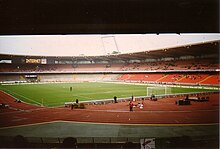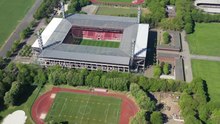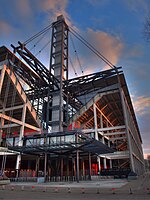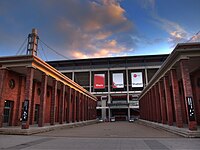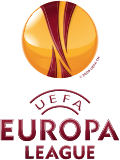Rheinenergiestadion
| Rheinenergiestadion | |
|---|---|
| Müngersdorfer Stadium | |

|
|

|
|
| South side of the stadium, in the foreground the Jahnwiesen | |
| Earlier names | |
|
|
| Sponsor name (s) | |
|
|
| Data | |
| place | Aachener Strasse 999 50933 Cologne , Germany |
| Coordinates | 50 ° 56 '0.4 " N , 6 ° 52' 30.5" E |
| owner | Cologne sports facilities GmbH |
| operator | Cologne sports facilities GmbH |
| start of building | December 20, 2001 |
| opening | January 31, 2004 |
| First game | January 31, 2004 1. FC Cologne - Borussia Mönchengladbach 1-0 |
| surface | Natural grass |
| costs | 117.5 million euros |
| architect |
Gerkan, Marg and Partner Schlaich Bergermann and Partner |
| capacity | 50,000 |
| Capacity (internat.) | 46.195 |
| playing area | 105 m × 68 m |
| Societies) | |
| Events | |
|
|
The Rheinenergiestadion ( proper spelling : RheinEnergieSTADION ), formerly and in parlance also Müngersdorfer Stadion , is a football stadium in the Müngersdorf district of Cologne and the venue of 1. FC Köln . As a result of a sponsorship agreement , it has been named after the Cologne energy supplier Rheinenergie since 2004 .
history
With the abolition of the fortifications agreed in the Versailles Treaty after the First World War , the city of Cologne had a wide, largely unused strip of land on the left bank of the Rhine, which could be re-used. The Mayor of Cologne at the time , Konrad Adenauer , on whose initiative the re-establishment of the University of Cologne , the KölnMesse and the settlement of the Ford works , pushed ahead with the conversion of the site into a green belt . A large sports center was to be built around the middle of this green belt in the Müngersdorf district. The idea was to offer the people of Cologne a range of leisure and sports areas on the one hand and to provide a modern stadium on the other.
From 1920, on Adenauer's initiative, the city began negotiations to acquire larger land from private individuals and also from the community of Weiden-Lövenich on Aachener Strasse for the planned “Sportpark Müngersdorf”. On September 22, 1921, the Cologne City Council decided to build the stadium for 15.4 million Reichsmarks; Construction began as early as October 1921. In addition to the main arena with around 80,000 spectator seats, two smaller stadiums (east and west arena), a cycling track, an outdoor pool as well as tennis and hockey courts and an area for heavy athletics were planned on the 80 hectare area . A stop system and sidings for the tram were also built. The facilities were not yet completed at the opening ceremony on September 16, 1923. The "Sportpark Müngersdorf" was the largest German sports facility until the Berlin Olympic Stadium was built in 1936.
A new building at the same location was planned for the 1974 World Cup . Already in the construction planning it became apparent that the projected construction costs were too high, so that Cologne did not host the World Cup. (Instead, the Westfalenstadion was built in Dortmund ). The transition period was a particularly precarious situation for Cologne professional football, as in the 1973/74 Bundesliga season, 1. FC Köln and SC Fortuna Köln, two Cologne clubs were represented in the top German division, which played their games in this season the Müngersdorfer Radrennbahn had to carry out. The new building, which was then built in a somewhat more cost-effective form for 45 million DM, with 61,000 spectator seats was opened on November 12, 1975 with a football game between local rivals 1. FC Köln and Fortuna Köln (3-0). At the same time, the Cologne public transport company rebuilt the station for the Cologne city railway for seven million DM . During the European Football Championship in 1988 , two games were played in Müngersdorf.
The city of Cologne was planning a new stadium for the 2006 World Cup because the old one no longer complied with FIFA regulations. The groundbreaking ceremony for the new football stadium took place on December 20, 2001. After a construction period of 30 months and construction costs of 117.5 million euros , the new World Cup-compatible stadium opened on January 31, 2004 when the last grandstand was opened. The stadium holds 50,000 spectators (41,825 seats and 8,175 standing), 46,195 according to international rules. This time the stadium was rebuilt in stages so that 1. FC Köln did not have to move during the construction period; however, audience capacity was limited for two years. The owner and operator is the Kölner Sportstätten GmbH.
In 2006 the stadium was one of the twelve venues for the soccer World Cup in Germany. During the tournament, a round of 16 and four preliminary round matches were played in the “FIFA World Cup Stadium Cologne” after three preliminary round matches had been played during the Confederations Cup in 2005 .
Since the stadium is usually sold out when 1. FC Cologne matches, the club was considering expanding it to up to 75,000 seats by 2017. However, a feasibility study commissioned by the association showed that an expansion is feasible, but not economically viable. Instead, only modernization is being considered.
A modification for the upper tier is planned for the 2024 European Football Championship , which will allow additional seats at the 2024 European Championship and international games. The capacity increases to 49,827.
use
The facility is mainly used by 1. FC Köln for the games of its professional football team. From 1926, the SpVgg Sülz 07 , one of the two predecessor clubs (the other is the Cologne BC) already played in the Müngersdorfer Radrennbahn .
From 1967 to 1978 SC Fortuna Köln played its home games here before moving to the Südstadion . In the sixties, another Cologne team played in the cycling track, SC Viktoria Köln . During the construction period of the stadium, which opened in 1975, the games of 1. FC Köln took place there. In 1983 the Müngersdorfer Stadion experienced a Cologne final with the DFB Cup final between 1. FC Köln and SC Fortuna Köln , which FC won 1-0. Next to the FC - - International Football Arena has various clubs around used as (evasive) home ground in European cup competitions, so in the 1980s by Bayer 04 Leverkusen and in the 2004/05 season for home games in the UEFA Cup the former second division soccer team Alemannia Aachen . From 2004 to 2007 American football was also played in the Rheinenergiestadion . The Cologne Centurions team played their home games here in NFL Europe (in 2007: NFL Europe).
In June 2005, three matches of the FIFA Confederations Cup 2005 took place at the stadium. The stadium offered 40,590 seats. The preliminary round matches Argentina against Tunisia, Germany against Tunisia and Brazil against Japan took place here. As part of the XX. World Youth Day in Cologne the opening service with Joachim Cardinal Meisner took place on August 16, 2005 in the Rheinenergiestadion . Below the north stand of the stadium is the FC Museum , in which the history of 1. FC Köln is presented. On August 5, 2007, the second edition of the Turkish Supercup took place in the stadium , which Fenerbahçe Istanbul won 2-1 against Beşiktaş Istanbul . The stadium was opened in 2005 by the IOC (International Olympic Committee) and the International Association for Sports and Leisure Facilities. V. awarded a bronze medal - as one of the best sports facilities in the world. A total of 93 stadiums and sports facilities from 25 countries took part in this competition.
The women's DFB Cup final has been taking place in the Cologne stadium since 2010. In May 2012, the DFB and the city of Cologne signed a contract that the cup final would remain in Cologne until at least 2015. In January 2018, the DFB and the city of Cologne agreed that the women's cup final would stay in the city until at least 2020. On June 19, 2020, the DFB decided that the women's final will remain in the Cologne stadium until at least 2023. In addition, there is an option until 2025.
In 2010 the opening and closing ceremonies of the Gay Games also took place in the stadium.
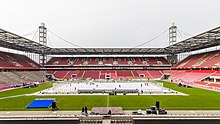
After the DEL Winter Game 2019 in front of 47,011 spectators, the stadium in Cologne is set to host the open-air ice hockey game for the second time in January 2021 . The Kölner Haie and the Adler Mannheim will face each other. The Cologne club is hosting a DEL winter game for the second time after 2019 and for the third time after 2015 and 2019. The temporary ice rink offers up to 50,000 seats, just like for football matches.
Since 2005 national and international stars have given many concerts in the Rheinenergiestadion. In addition to the major events (football, concerts, etc.), a large number of company events (meetings, congresses, conferences, company celebrations, etc.) take place in the business areas of the stadium every year.
Other buildings and facilities
The stadium is surrounded by other sports facilities: a cycling track (the Albert-Richter-Radstadion ), several soccer fields , including one with a tartan track, an outdoor pool that was renovated by summer 2011 and supplemented by an indoor pool , as well as the training grounds of the ASV Köln ( Athletics ) and the hockey and tennis courts of Rot-Weiß Köln . On the opposite side of Aachener Straße there was also a riding stadium, which was converted into a baseball field . The European baseball championship was held there in 2001 . Adjacent to the west is the site of the German Sport University, which was founded in 1947 and has resided here since 1960 . The now listed buildings in front of the stadium initially not only offered space for the necessary changing rooms, but also for a gym and a small indoor swimming pool. The ensemble is complemented by a generous area of green areas in front of and behind the stadium: the approximately 5 hectare “Vorwiesen” between Aachener Strasse and the stadium and the approximately 8 hectare “Jahnwiese” south of the stadium, which is used for football games and open airs Air concerts can be used.
Confederations Cup 2005
The stadium was the venue for the 2005 FIFA Confederations Cup . During the Confederation Cup, the stadium was named without its sponsor's name and, as at the World Cup one year later, was called “FIFA World Cup Stadium Cologne”, with a capacity of 40,590 spectators.
The following games took place during the Confederation Cup 2005 in Cologne:
| June 15, 6 p.m., Cologne, Group A | |||
| Argentina | - | Tunisia | 2: 1 (1: 0) |
| June 18, 6 p.m., Cologne, Group A | |||
| Tunisia | - | Germany | 0: 3 (0: 0) |
| June 22, 8:45 p.m., Cologne, Group B | |||
| Japan | - | Brazil | 2: 2 (1: 2) |
Football World Cup 2006
The stadium was the venue for the 2006 World Cup . During the World Cup, the stadium was named without its sponsor's name and was called “FIFA World Cup Stadium Cologne”, with a capacity of 45,000 spectators.
The following games took place during the 2006 World Cup in Cologne:
| Sun, June 11, 2006, 9 p.m. Group D | |||
|
|
- |
|
1: 0 (1: 0) |
| Sat, June 17, 2006, 6 p.m. Group E | |||
|
|
- |
|
0: 2 (0: 1) |
| Tue, June 20, 2006, 9 p.m. Group B | |||
|
|
- |
|
2: 2 (0: 1) |
| Fri, June 23, 2006, 9 p.m. Group G | |||
|
|
- |
|
0: 2 (0: 0) |
| Mon, June 26, 2006, 9 p.m. Round of 16 | |||
|
|
- |
|
0: 0 n.V., 0: 3 i. E. |
Games of the German national soccer team
The German national soccer team has so far played the following matches in the stadium:
| November 20, 1927, friendly match | |||
|
|
- |
|
2: 2 |
| June 23, 1929, friendly match | |||
| - |
|
3-0 | |
| May 12, 1935, friendly match | |||
|
|
- | 1: 2 | |
| February 6, 1938, friendly match | |||
|
|
- |
|
1: 1 |
| April 6, 1941, friendly match | |||
| - |
|
7-0 | |
| 4th May 1952, friendly match | |||
| - |
|
3-0 | |
| March 22nd 1953, friendly match | |||
|
|
- |
|
0-0 |
| December 23rd 1956, friendly match | |||
| - |
|
4: 1 | |
| October 21, 1959, friendly match | |||
| - |
|
7-0 | |
| 19th November 1966, friendly match | |||
| - |
|
3-0 | |
| 17th October 1970, European Championship qualification | |||
|
|
- |
|
1: 1 |
| April 27, 1977, friendly match | |||
| - |
|
5-0 | |
| October 17, 1979, European Championship qualification | |||
| - |
|
5: 1 | |
| April 14th 1982, friendly match | |||
| - |
|
2: 1 | |
| 17th October 1984, World Cup qualification | |||
| - |
|
2-0 | |
| April 18, 1987, friendly match | |||
|
|
- |
|
0-0 |
| November 15, 1989, World Cup qualification | |||
| - |
|
2: 1 | |
| November 17th 1993, friendly match | |||
| - |
|
2: 1 | |
| April 22, 1998, friendly match | |||
| - |
|
1-0 | |
| March 31, 2004, friendly match | |||
| - |
|
3-0 | |
| June 18, 2005, 2005 FIFA Confederations Cup | |||
|
|
- | 0: 3 | |
| September 12, 2007, friendly match | |||
| - |
|
3: 1 | |
| September 7, 2010, European Championship qualification | |||
| - |
|
6: 1 | |
| October 11, 2013, World Cup qualification | |||
| - |
|
3-0 | |
| June 10, 2015, friendly match | |||
|
|
- | 1: 2 | |
| November 14th 2017, friendly match | |||
|
|
- |
|
2: 2 |
Athletics events
Since the two previous structures of today's stadium were not purely football stadiums, but multi-purpose stadiums, there were also major athletics events in Müngersdorf. The sports festivals of the ASV Köln, which took place almost annually from 1934 to 1999, were well known. The German Athletics Championships in 1933, 1947, 1978 and 1996 were also held in the Müngersdorfer Stadium.
Concerts
The stadium is also used as a venue for large concerts. The old Müngersdorfer Stadion performed: The Rolling Stones , Tina Turner , Guns N 'Roses , Dire Straits , Pink Floyd , AC / DC , U2 , Die Toten Hosen , BAP , Peter Maffay , Michael Jackson , Simply Red , Genesis , Bon Jovi , ZZ Top , Simple Minds , Bryan Adams , Supertramp , Marillion , Marius Müller-Westernhagen , Aerosmith , Robbie Williams , Wolfgang Petry and Queen .
In the new stadium, Phil Collins (June 2004, June 2019), Bläck Fööss , Brings , Wise Guys , Höhner (September 2004), Queen + Paul Rodgers (July 2005), The Rolling Stones (July 2006), Die Ärzte ( on New Year's Eve 2006 and June 2013), Herbert Grönemeyer (June 2007, June 2011), AC / DC (May 2009), Die Fantastischen Vier und Clueso (on New Year's Eve 2009), Pink (May 2010), Brings (July 2011, June 2016), Bruce Springsteen (May 2012), Unheilig (July 2012, September 2016), Coldplay (September 2012), Bon Jovi (June 2013), Die Toten Hosen (June 2013), Helene Fischer (June 2015), Queen + Adam Lambert (May 2016), Rihanna (July 2016), Depeche Mode (June 2017), Beyoncé with Jay-Z (July 2018) and Metallica (June 2019).
gallery
View from block N11 into the stadium during the game between 1. FC and SC Freiburg on February 2, 2020
Trivia
- The Cologne Zeltinger Band released the song "Müngersdorfer Stadion" in 1981. It was a version of "Rockaway Beach" in the Cologne dialect, which originally came from the Ramones . However, the song is not about the football stadium, but about a day in the neighboring outdoor pool.
- The South Stand was built in honor of Hans Schäfer in Hans Shepherd Südkurve renamed and was the home game against 1. FC Union Berlin on August 14, 2018 for the first time this name.
- Since October 2014 there has been a memorial for Heinz Flohe , one of the most successful players at 1. FC Köln , in front of the south stand .
- During the Advent season, not all the cornerstones are illuminated from the 1st to the 4th Advent, so that the Rheinenergiestadion is one of the largest Advent wreaths in the world.
literature
- Gabi Langen: Müngersdorfer Stadium Cologne. Emons-Verlag, Cologne 1998, ISBN 3-89705-126-5 .
See also
Web links
- Official website
- Website of the Cologne sports facilities
- Film by the construction company Max Bögl about the new construction of the RheinEnergieStadion
- 3D model of the RheinEnergieStadion Cologne
- Site plan of the RheinEnergieStadion Cologne
- Virtual tour through the RheinEnergieStadion Cologne
Individual evidence
- ^ Match report 1. FC Köln against Borussia Mönchengladbach , weltfussball.de
- ↑ RheinEnergieStadion , sbp.de (PDF file)
- ↑ a b c About the stadium. The home ground of 1. FC Köln. In: fc.de. 1. FC Köln , accessed on April 18, 2019 .
- ↑ Peter Fuchs (Ed.): Chronik zur Geschichte der Stadt Köln , Volume 2, 1991, p. 360.
- ↑ April 2, 1974 - opening of the Dortmund Westfalenstadion WDR deadline, accessed on August 21, 2018.
- ↑ Peter Fuchs (ed.): Chronicle of the history of the city of Cologne. Volume 2, 1991, p. 314.
- ^ Website of the Kölner Sportstätten GmbH
- ↑ Stadium discussion: This is what FC, Mayor Reker and the council groups say about the expansion shock. August 23, 2017. Retrieved June 12, 2019 .
- ↑ Martin Zenge: New FC board team: Old acquaintance helps - clear words to the stadium and investors. May 14, 2019, accessed June 12, 2019 .
- ↑ stadionwelt.de: Women's Cup still in Cologne Article from May 3, 2012.
- ↑ stadionwelt.de: Women's football: DFB Cup final remains in Cologne Article from January 22, 2018
- ↑ DFB Cup final for women until 2023 in Cologne. In: stadionwelt.de. June 22, 2020, accessed June 25, 2020 .
- ↑ DEL Winter Game again in the RheinEnergieSTADION. In: stadionwelt.de. February 18, 2020, accessed February 18, 2020 .
- ↑ Zeltinger-Müngersdorfer Stadium
- ↑ Monument to Cologne's greatest , fc.de, August 14, 2018, accessed on August 15, 2018.
- ↑ Footballer statue - Heinz Flohe dribbles in front of the south stand. In: Kölner Stadt-Anzeiger. October 17, 2014, accessed January 4, 2020 .
- ↑ Europe's largest Advent wreath shines at the RheinEnergieSTADION in Cologne. In: City News. December 4, 2018, accessed January 4, 2020 .
